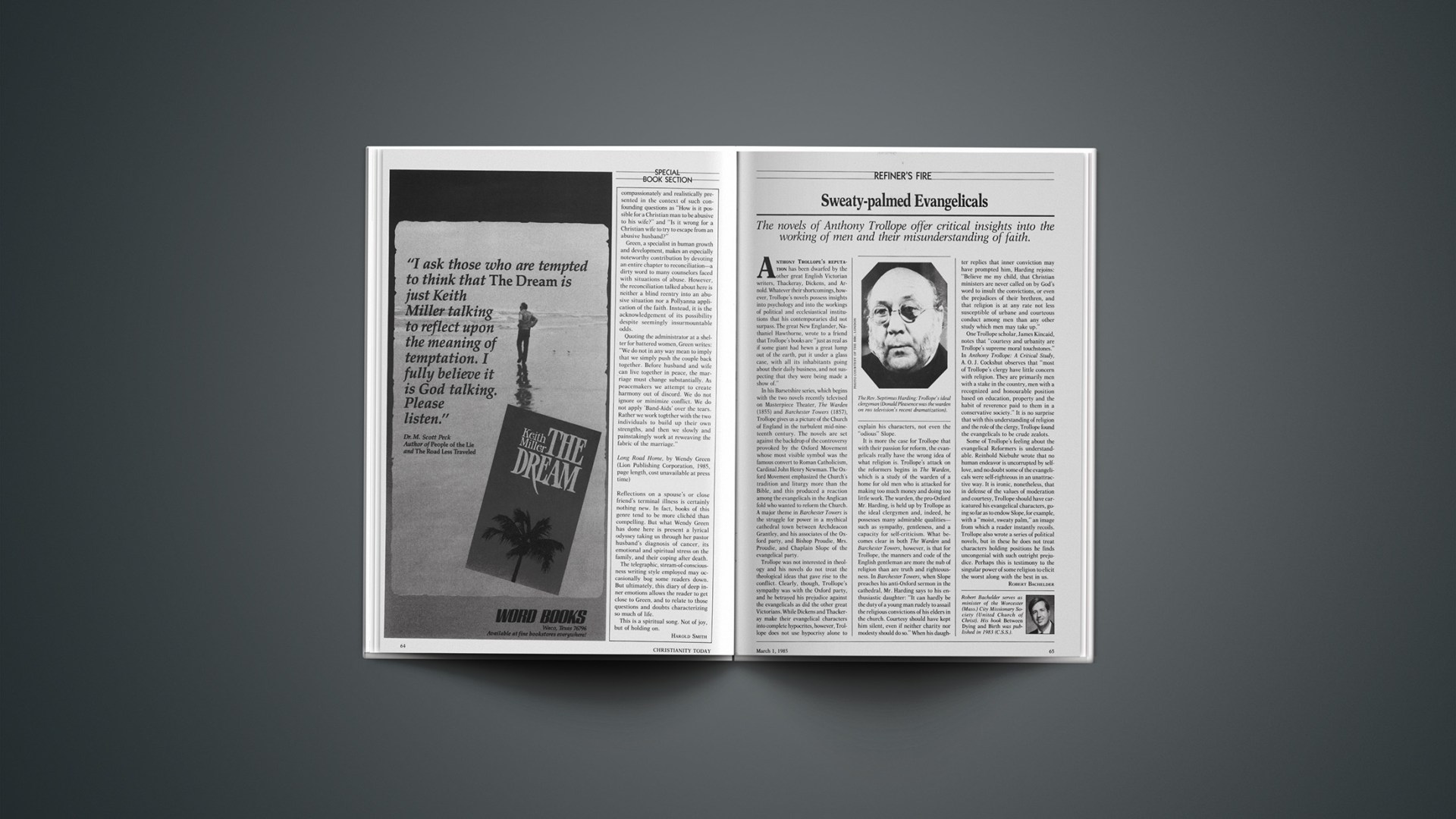The novels of Anthony Trollope offer critical insights into the working of men and their misunderstanding of faith.
Anthony Trollope’s reputation has been dwarfed by the other great English Victorian writers, Thackeray, Dickens, and Arnold. Whatever their shortcomings, however, Trollope’s novels possess insights into psychology and into the workings of political and ecclesiastical institutions that his contemporaries did not surpass. The great New Englander, Nathaniel Hawthorne, wrote to a friend that Trollope’s books are “just as real as if some giant had hewn a great lump out of the earth, put it under a glass case, with all its inhabitants going about their daily business, and not suspecting that they were being made a show of.”
In his Barsetshire series, which begins with the two novels recently televised on Masterpiece Theater, The Warden (1855) and Barchester Towers (1857), Trollope gives us a picture of the Church of England in the turbulent mid-nineteenth century. The novels are set against the backdrop of the controversy provoked by the Oxford Movement whose most visible symbol was the famous convert to Roman Catholicism, Cardinal John Henry Newman. The Oxford Movement emphasized the Church’s tradition and liturgy more than the Bible, and this produced a reaction among the evangelicals in the Anglican fold who wanted to reform the Church. A major theme in Barchester Towers is the struggle for power in a mythical cathedral town between Archdeacon Grantley, and his associates of the Oxford party, and Bishop Proudie, Mrs. Proudie, and Chaplain Slope of the evangelical party.
Trollope was not interested in theology and his novels do not treat the theological ideas that gave rise to the conflict. Clearly, though, Trollope’s sympathy was with the Oxford party, and he betrayed his prejudice against the evangelicals as did the other great Victorians. While Dickens and Thackeray make their evangelical characters into complete hypocrites, however, Trollope does not use hypocrisy alone to explain his characters, not even the “odious” Slope.
It is more the case for Trollope that with their passion for reform, the evangelicals really have the wrong idea of what religion is. Trollope’s attack on the reformers begins in The Warden, which is a study of the warden of a home for old men who is attacked for making too much money and doing too little work. The warden, the pro-Oxford Mr. Harding, is held up by Trollope as the ideal clergymen and, indeed, he possesses many admirable qualities—such as sympathy, gentleness, and a capacity for self-criticism. What becomes clear in both The Warden and Barchester Towers, however, is that for Trollope, the manners and code of the English gentleman are more the nub of religion than are truth and righteousness. In Barchester Towers, when Slope preaches his anti-Oxford sermon in the cathedral, Mr. Harding says to his enthusiastic daughter: “It can hardly be the duty of a young man rudely to assail the religious convictions of his elders in the church. Courtesy should have kept him silent, even if neither charity nor modesty should do so.” When his daughter replies that inner conviction may have prompted him, Harding rejoins: “Believe me my child, that Christian ministers are never called on by God’s word to insult the convictions, or even the prejudices of their brethren, and that religion is at any rate not less susceptible of urbane and courteous conduct among men than any other study which men may take up.”
One Trollope scholar, James Kincaid, notes that “courtesy and urbanity are Trollope’s supreme moral touchstones.” In Anthony Trollope: A Critical Study, A. O. J. Cockshut observes that “most of Trollope’s clergy have little concern with religion. They are primarily men with a stake in the country, men with a recognized and honourable position based on education, property and the habit of reverence paid to them in a conservative society.” It is no surprise that with this understanding of religion and the role of the clergy, Trollope found the evangelicals to be crude zealots.
Some of Trollope’s feeling about the evangelical Reformers is understandable. Reinhold Niebuhr wrote that no human endeavor is uncorrupted by self-love, and no doubt some of the evangelicals were self-righteous in an unattractive way. It is ironic, nonetheless, that in defense of the values of moderation and courtesy, Trollope should have caricatured his evangelical characters, going so far as to endow Slope, for example, with a “moist, sweaty palm,” an image from which a reader instantly recoils. Trollope also wrote a series of political novels, but in these he does not treat characters holding positions he finds uncongenial with such outright prejudice. Perhaps this is testimony to the singular power of some religion to elicit the worst along with the best in us.
1 Robert Bachelder serves as minister of the Worcester (Mass.) City Missionary Society (United Church of Christ). His book Between Dying and Birth was published in 1983 (C.S.S.).










